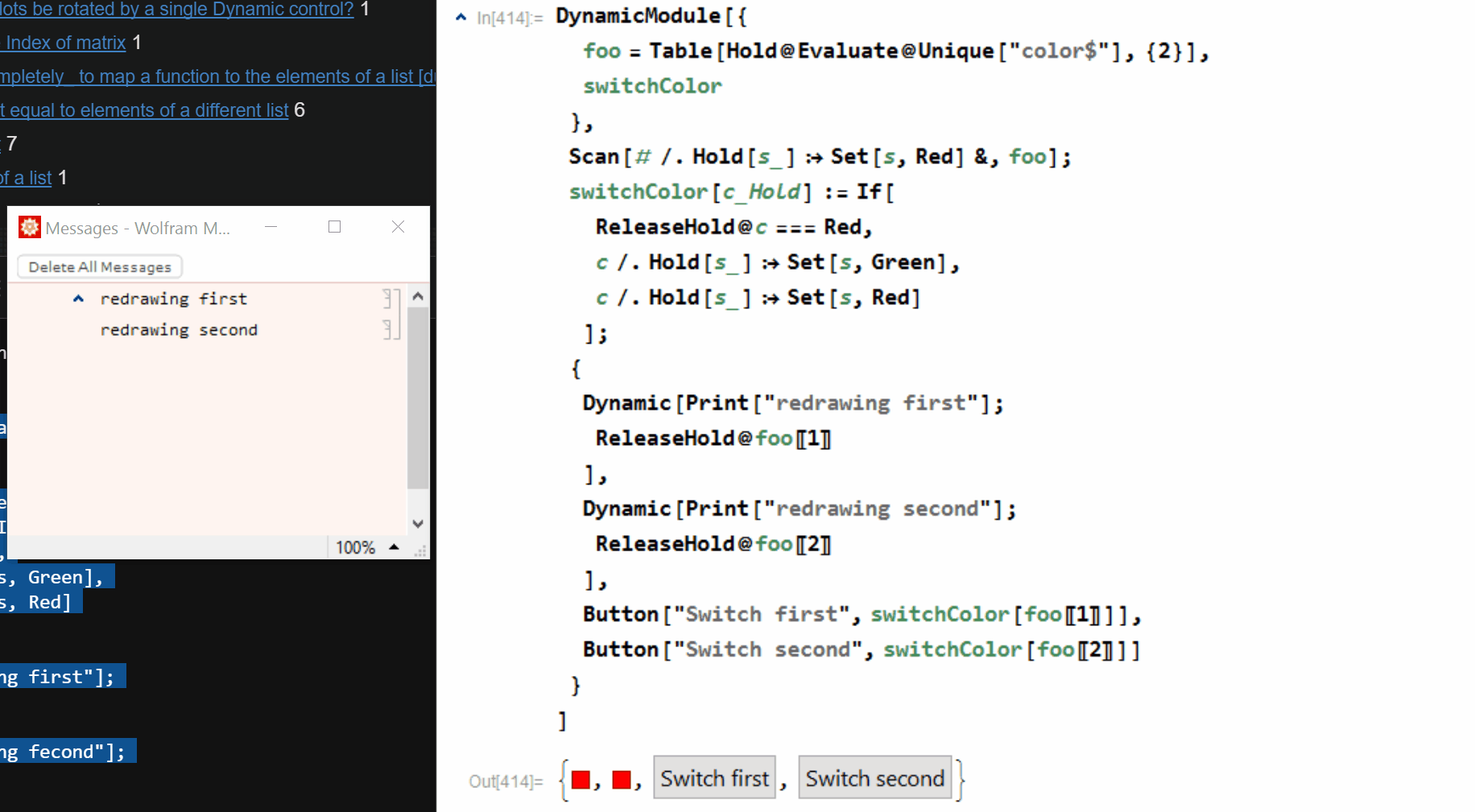Consider the following example:
DynamicModule[{foo = {Red, Green}, switchColor},
Attributes[switchColor] = {HoldAll};
switchColor[c_] := If[c === Red, c = Green, c = Red];
{
Dynamic[Print["redrawing first"]; foo[[1]]],
Dynamic[Print["redrawing Second"]; foo[[2]]],
Button["Switch first", switchColor[foo[[1]]]],
Button["Switch second", switchColor[foo[[2]]]]
}
]

(in the gif for some reason it appears that the first color is updated incorrectly, while this is not the case)
This works totally fine, but a quick look to the messages reveals that even when changing only a single element of the list, both of the Dynamic are updated.
Now, this is not really surprising: there is just one variable to be tracked. However, I was wondering if there was a way to go around this, as it can be handy to be able to track independently single elements of a list.
One way around it is to fine foo as a list of held variables, and wire Dynamic to those variables directly. This works, as can be seen in the following:
DynamicModule[{
foo = Table[Hold@Evaluate@Unique["color$"], {2}],
switchColor
},
Scan[# /. Hold[s_] :> Set[s, Red] &, foo];
switchColor[c_Hold] := If[
ReleaseHold@c === Red,
c /. Hold[s_] :> Set[s, Green],
c /. Hold[s_] :> Set[s, Red]
];
{
Dynamic[Print["redrawing first"];
ReleaseHold@foo[[1]]
],
Dynamic[Print["redrawing second"];
ReleaseHold@foo[[2]]
],
Button["Switch first", switchColor[foo[[1]]]],
Button["Switch second", switchColor[foo[[2]]]]
}
]
My problem with this approach is that I suspect that this makes the variables that are actually being used, that is, color$xxxx, not being defined in front end, as would be the case for variables localised inside a DynamicModule.
Is there a way around this? Or can I somehow force the variables to be defined in the front end like they would be in a DynamicModule?
Bonus question:
Why does the above code work? Having Dynamic the HoldFirst attribute I would have expected it not to be able to understand that the variable to be tracked is the one inside the hold in the first element of foo. How does it do that?
Answer
I think I got it. Again using bump from Elegant manipulation of the variables list
func_[a___, bump[lst_, idx___], b___] ^:=
func[a, #, b] & @ Part[List @@@ Unevaluated @@ {lst}, {1}, idx]
Unique @ Table["color$", {2}] /. _[x__] :>
DynamicModule[{foo, switchColor, x},
foo = Hold[x];
switchColor[c_] := c = If[c === Red, Green, Red];
switchColor /@ bump[foo];
{
Dynamic[ Context @ bump[foo, 1] ],
Dynamic[ Print["redrawing first"]; foo[[1]] ],
Dynamic[ Print["redrawing second"]; foo[[2]] ],
Button["Switch first", switchColor @ bump[foo, 1]],
Button["Switch second", switchColor @ bump[foo, 2]]
}
]


Comments
Post a Comment